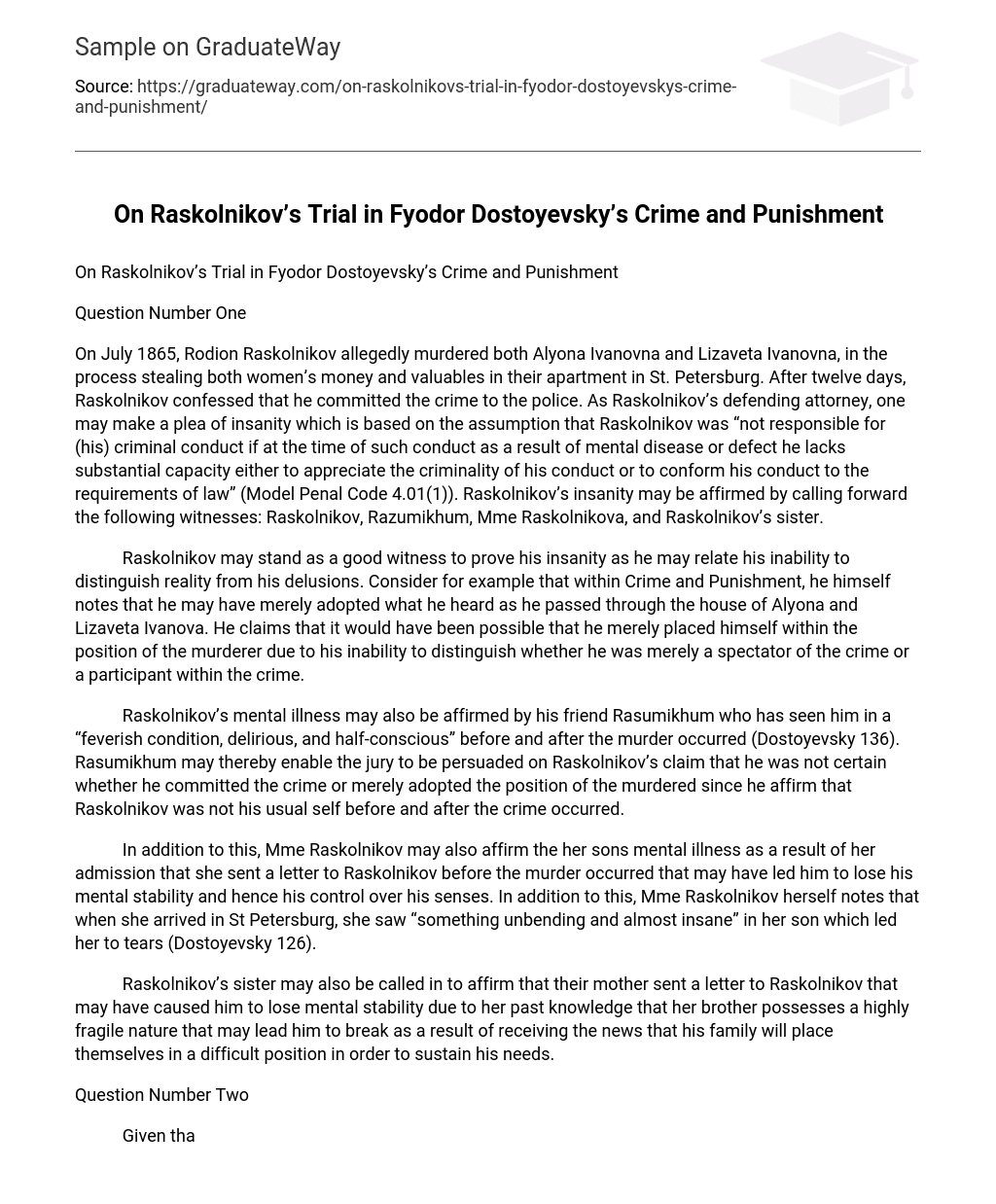Question Number One
On July 1865, Rodion Raskolnikov allegedly murdered both Alyona Ivanovna and Lizaveta Ivanovna, in the process stealing both women’s money and valuables in their apartment in St. Petersburg. After twelve days, Raskolnikov confessed that he committed the crime to the police. As Raskolnikov’s defending attorney, one may make a plea of insanity which is based on the assumption that Raskolnikov was “not responsible for (his) criminal conduct if at the time of such conduct as a result of mental disease or defect he lacks substantial capacity either to appreciate the criminality of his conduct or to conform his conduct to the requirements of law” (Model Penal Code 4.01(1)). Raskolnikov’s insanity may be affirmed by calling forward the following witnesses: Raskolnikov, Razumikhum, Mme Raskolnikova, and Raskolnikov’s sister.
Raskolnikov may stand as a good witness to prove his insanity as he may relate his inability to distinguish reality from his delusions. Consider for example that within Crime and Punishment, he himself notes that he may have merely adopted what he heard as he passed through the house of Alyona and Lizaveta Ivanova. He claims that it would have been possible that he merely placed himself within the position of the murderer due to his inability to distinguish whether he was merely a spectator of the crime or a participant within the crime.
Raskolnikov’s mental illness may also be affirmed by his friend Rasumikhum who has seen him in a “feverish condition, delirious, and half-conscious” before and after the murder occurred (Dostoyevsky 136). Rasumikhum may thereby enable the jury to be persuaded on Raskolnikov’s claim that he was not certain whether he committed the crime or merely adopted the position of the murdered since he affirm that Raskolnikov was not his usual self before and after the crime occurred.
In addition to this, Mme Raskolnikov may also affirm the her sons mental illness as a result of her admission that she sent a letter to Raskolnikov before the murder occurred that may have led him to lose his mental stability and hence his control over his senses. In addition to this, Mme Raskolnikov herself notes that when she arrived in St Petersburg, she saw “something unbending and almost insane” in her son which led her to tears (Dostoyevsky 126).
Raskolnikov’s sister may also be called in to affirm that their mother sent a letter to Raskolnikov that may have caused him to lose mental stability due to her past knowledge that her brother possesses a highly fragile nature that may lead him to break as a result of receiving the news that his family will place themselves in a difficult position in order to sustain his needs.
Question Number Two
Given that Raskolnikov was convicted of first degree murder and voluntary manslaughter, to resort to the plea for insanity may still lead to Raskolnikov’s conviction. The reasons for these are as follows: (1) Not everyone believed that Raskolnikov was insane [consider for example Sonya and detective Porfiry], (2) Although Raskolnikov was portrayed as an individual prone to insanity within the text, he was also depicted as an individual who thinks rationally and systematically hence one may question whether Raskolnikov really did lose his state of mind during the occurrence of the murder. In addition to this, one may also argue that Raskolnikov acted in such a way that he was deranged during his encounters with Rasumikhum since he knows that there is a large possibility that Rasumikhum may be called in as a witness for his defense. (3)Finally, Raskolnikov himself confessed that he committed the crime and was repentant about his actions. To admit and to state that he was repentant about his actions would merely affirm that he was in full control of his mental capacities during the time that he committed the act.
Works Cited
Dostoyevsky. Fyodor. Crime and Punishment. New York: Signet Classics, 1999.
Model Penal Code, 11, § 4.01.





